ECCWC401A: Exploring Aboriginal and Torres Strait Islander Education
VerifiedAdded on 2023/06/07
|12
|3358
|104
Report
AI Summary
This report delves into Aboriginal and Torres Strait Islander education within the context of Early Childhood Education and Care (ECEC). It examines the importance of understanding Aboriginal community perspectives, the significance of cultural diversity, and the role of educators in liaising with the community. The report highlights curriculum provisions, teaching strategies, and the influence of cultural protocols on educators' practices. It emphasizes the need for educators to respect and integrate Aboriginal and Torres Strait Islander cultures and beliefs into the learning environment, promoting a culturally safe and inclusive space for children's development and learning. The document further explores the eight pedagogies and their application in educational programming, advocating for a holistic approach that values community involvement and cultural awareness.
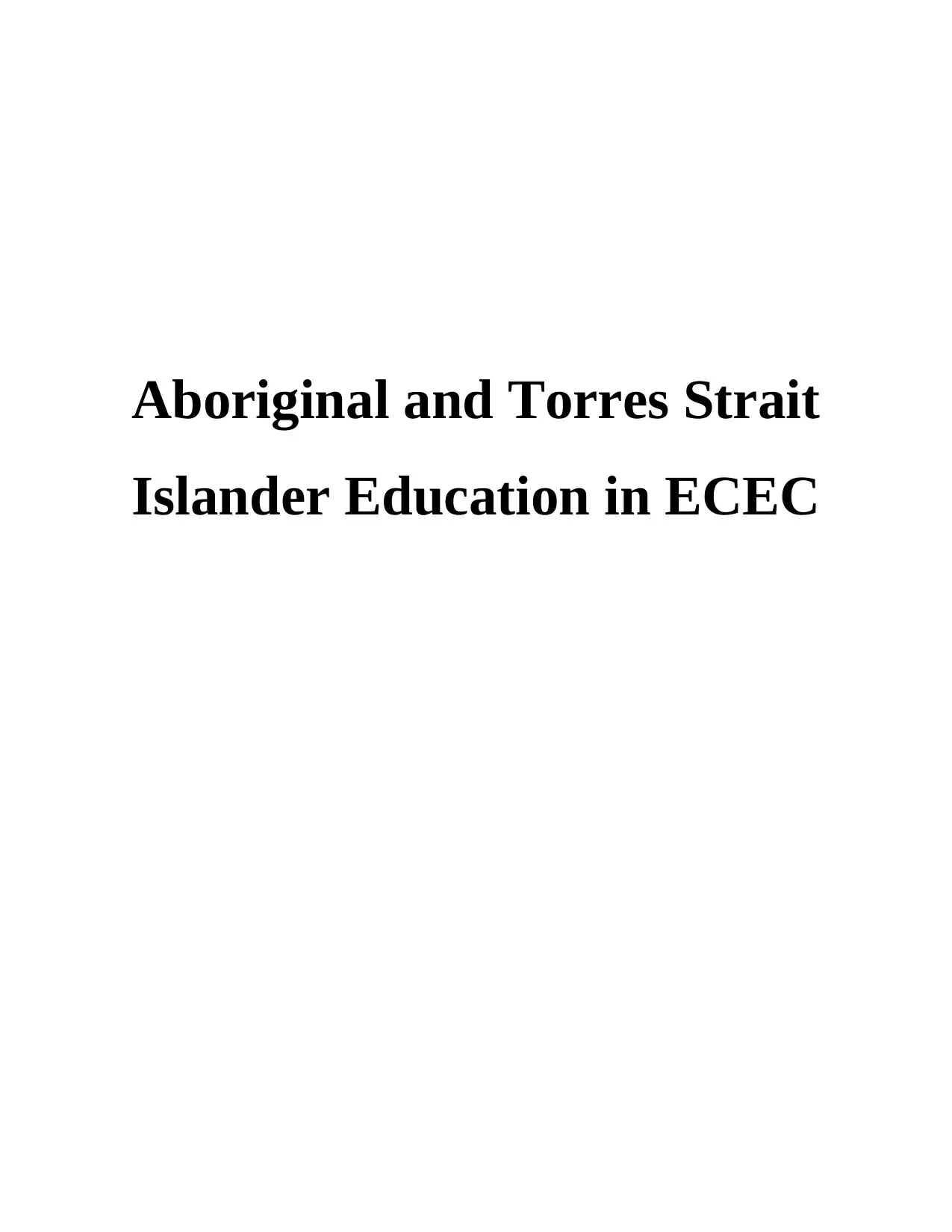
Aboriginal and Torres Strait
Islander Education in ECEC
Islander Education in ECEC
Paraphrase This Document
Need a fresh take? Get an instant paraphrase of this document with our AI Paraphraser
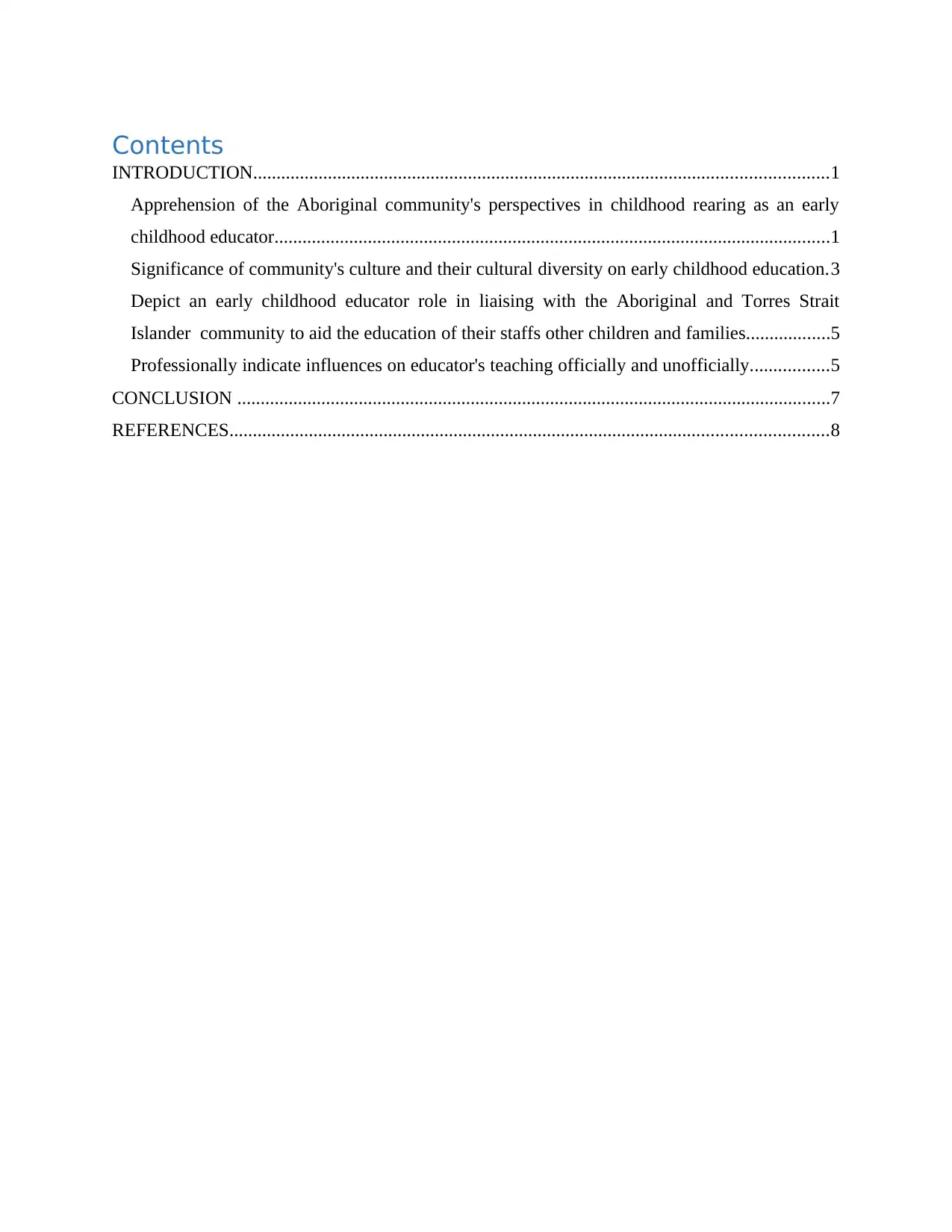
Contents
INTRODUCTION...........................................................................................................................1
Apprehension of the Aboriginal community's perspectives in childhood rearing as an early
childhood educator.......................................................................................................................1
Significance of community's culture and their cultural diversity on early childhood education.3
Depict an early childhood educator role in liaising with the Aboriginal and Torres Strait
Islander community to aid the education of their staffs other children and families..................5
Professionally indicate influences on educator's teaching officially and unofficially.................5
CONCLUSION ...............................................................................................................................7
REFERENCES................................................................................................................................8
INTRODUCTION...........................................................................................................................1
Apprehension of the Aboriginal community's perspectives in childhood rearing as an early
childhood educator.......................................................................................................................1
Significance of community's culture and their cultural diversity on early childhood education.3
Depict an early childhood educator role in liaising with the Aboriginal and Torres Strait
Islander community to aid the education of their staffs other children and families..................5
Professionally indicate influences on educator's teaching officially and unofficially.................5
CONCLUSION ...............................................................................................................................7
REFERENCES................................................................................................................................8

⊘ This is a preview!⊘
Do you want full access?
Subscribe today to unlock all pages.

Trusted by 1+ million students worldwide
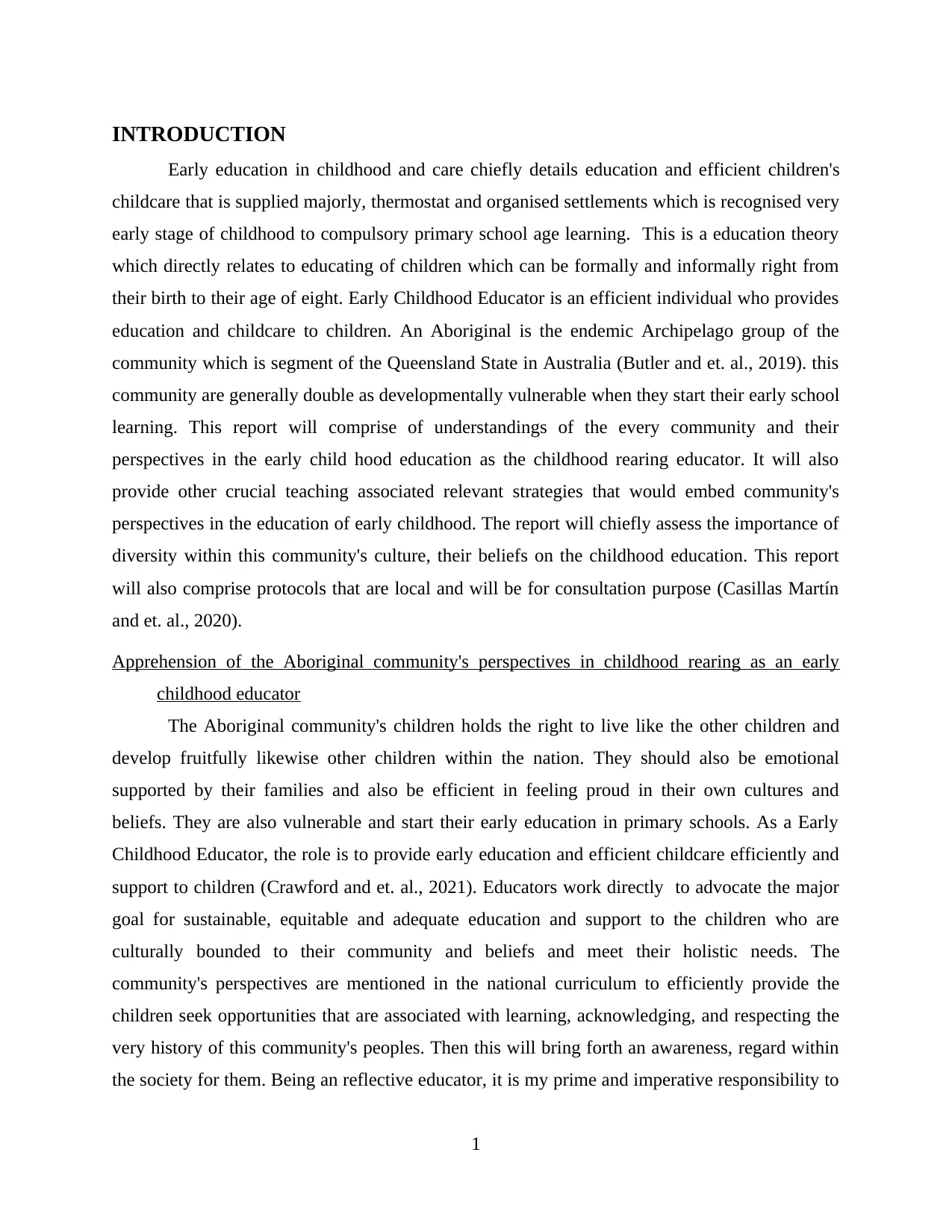
INTRODUCTION
Early education in childhood and care chiefly details education and efficient children's
childcare that is supplied majorly, thermostat and organised settlements which is recognised very
early stage of childhood to compulsory primary school age learning. This is a education theory
which directly relates to educating of children which can be formally and informally right from
their birth to their age of eight. Early Childhood Educator is an efficient individual who provides
education and childcare to children. An Aboriginal is the endemic Archipelago group of the
community which is segment of the Queensland State in Australia (Butler and et. al., 2019). this
community are generally double as developmentally vulnerable when they start their early school
learning. This report will comprise of understandings of the every community and their
perspectives in the early child hood education as the childhood rearing educator. It will also
provide other crucial teaching associated relevant strategies that would embed community's
perspectives in the education of early childhood. The report will chiefly assess the importance of
diversity within this community's culture, their beliefs on the childhood education. This report
will also comprise protocols that are local and will be for consultation purpose (Casillas Martín
and et. al., 2020).
Apprehension of the Aboriginal community's perspectives in childhood rearing as an early
childhood educator
The Aboriginal community's children holds the right to live like the other children and
develop fruitfully likewise other children within the nation. They should also be emotional
supported by their families and also be efficient in feeling proud in their own cultures and
beliefs. They are also vulnerable and start their early education in primary schools. As a Early
Childhood Educator, the role is to provide early education and efficient childcare efficiently and
support to children (Crawford and et. al., 2021). Educators work directly to advocate the major
goal for sustainable, equitable and adequate education and support to the children who are
culturally bounded to their community and beliefs and meet their holistic needs. The
community's perspectives are mentioned in the national curriculum to efficiently provide the
children seek opportunities that are associated with learning, acknowledging, and respecting the
very history of this community's peoples. Then this will bring forth an awareness, regard within
the society for them. Being an reflective educator, it is my prime and imperative responsibility to
1
Early education in childhood and care chiefly details education and efficient children's
childcare that is supplied majorly, thermostat and organised settlements which is recognised very
early stage of childhood to compulsory primary school age learning. This is a education theory
which directly relates to educating of children which can be formally and informally right from
their birth to their age of eight. Early Childhood Educator is an efficient individual who provides
education and childcare to children. An Aboriginal is the endemic Archipelago group of the
community which is segment of the Queensland State in Australia (Butler and et. al., 2019). this
community are generally double as developmentally vulnerable when they start their early school
learning. This report will comprise of understandings of the every community and their
perspectives in the early child hood education as the childhood rearing educator. It will also
provide other crucial teaching associated relevant strategies that would embed community's
perspectives in the education of early childhood. The report will chiefly assess the importance of
diversity within this community's culture, their beliefs on the childhood education. This report
will also comprise protocols that are local and will be for consultation purpose (Casillas Martín
and et. al., 2020).
Apprehension of the Aboriginal community's perspectives in childhood rearing as an early
childhood educator
The Aboriginal community's children holds the right to live like the other children and
develop fruitfully likewise other children within the nation. They should also be emotional
supported by their families and also be efficient in feeling proud in their own cultures and
beliefs. They are also vulnerable and start their early education in primary schools. As a Early
Childhood Educator, the role is to provide early education and efficient childcare efficiently and
support to children (Crawford and et. al., 2021). Educators work directly to advocate the major
goal for sustainable, equitable and adequate education and support to the children who are
culturally bounded to their community and beliefs and meet their holistic needs. The
community's perspectives are mentioned in the national curriculum to efficiently provide the
children seek opportunities that are associated with learning, acknowledging, and respecting the
very history of this community's peoples. Then this will bring forth an awareness, regard within
the society for them. Being an reflective educator, it is my prime and imperative responsibility to
1
Paraphrase This Document
Need a fresh take? Get an instant paraphrase of this document with our AI Paraphraser
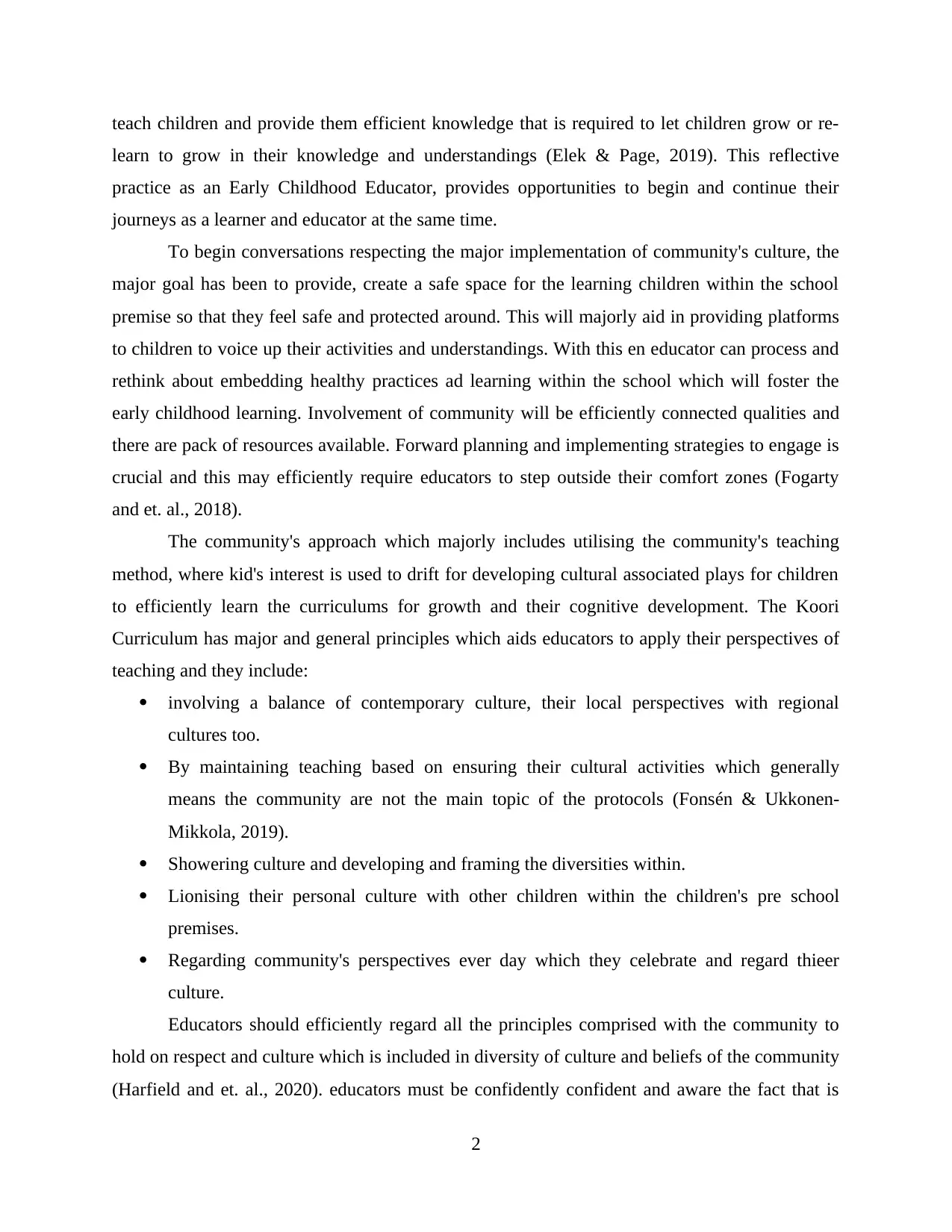
teach children and provide them efficient knowledge that is required to let children grow or re-
learn to grow in their knowledge and understandings (Elek & Page, 2019). This reflective
practice as an Early Childhood Educator, provides opportunities to begin and continue their
journeys as a learner and educator at the same time.
To begin conversations respecting the major implementation of community's culture, the
major goal has been to provide, create a safe space for the learning children within the school
premise so that they feel safe and protected around. This will majorly aid in providing platforms
to children to voice up their activities and understandings. With this en educator can process and
rethink about embedding healthy practices ad learning within the school which will foster the
early childhood learning. Involvement of community will be efficiently connected qualities and
there are pack of resources available. Forward planning and implementing strategies to engage is
crucial and this may efficiently require educators to step outside their comfort zones (Fogarty
and et. al., 2018).
The community's approach which majorly includes utilising the community's teaching
method, where kid's interest is used to drift for developing cultural associated plays for children
to efficiently learn the curriculums for growth and their cognitive development. The Koori
Curriculum has major and general principles which aids educators to apply their perspectives of
teaching and they include:
involving a balance of contemporary culture, their local perspectives with regional
cultures too.
By maintaining teaching based on ensuring their cultural activities which generally
means the community are not the main topic of the protocols (Fonsén & Ukkonen-
Mikkola, 2019).
Showering culture and developing and framing the diversities within.
Lionising their personal culture with other children within the children's pre school
premises.
Regarding community's perspectives ever day which they celebrate and regard thieer
culture.
Educators should efficiently regard all the principles comprised with the community to
hold on respect and culture which is included in diversity of culture and beliefs of the community
(Harfield and et. al., 2020). educators must be confidently confident and aware the fact that is
2
learn to grow in their knowledge and understandings (Elek & Page, 2019). This reflective
practice as an Early Childhood Educator, provides opportunities to begin and continue their
journeys as a learner and educator at the same time.
To begin conversations respecting the major implementation of community's culture, the
major goal has been to provide, create a safe space for the learning children within the school
premise so that they feel safe and protected around. This will majorly aid in providing platforms
to children to voice up their activities and understandings. With this en educator can process and
rethink about embedding healthy practices ad learning within the school which will foster the
early childhood learning. Involvement of community will be efficiently connected qualities and
there are pack of resources available. Forward planning and implementing strategies to engage is
crucial and this may efficiently require educators to step outside their comfort zones (Fogarty
and et. al., 2018).
The community's approach which majorly includes utilising the community's teaching
method, where kid's interest is used to drift for developing cultural associated plays for children
to efficiently learn the curriculums for growth and their cognitive development. The Koori
Curriculum has major and general principles which aids educators to apply their perspectives of
teaching and they include:
involving a balance of contemporary culture, their local perspectives with regional
cultures too.
By maintaining teaching based on ensuring their cultural activities which generally
means the community are not the main topic of the protocols (Fonsén & Ukkonen-
Mikkola, 2019).
Showering culture and developing and framing the diversities within.
Lionising their personal culture with other children within the children's pre school
premises.
Regarding community's perspectives ever day which they celebrate and regard thieer
culture.
Educators should efficiently regard all the principles comprised with the community to
hold on respect and culture which is included in diversity of culture and beliefs of the community
(Harfield and et. al., 2020). educators must be confidently confident and aware the fact that is
2
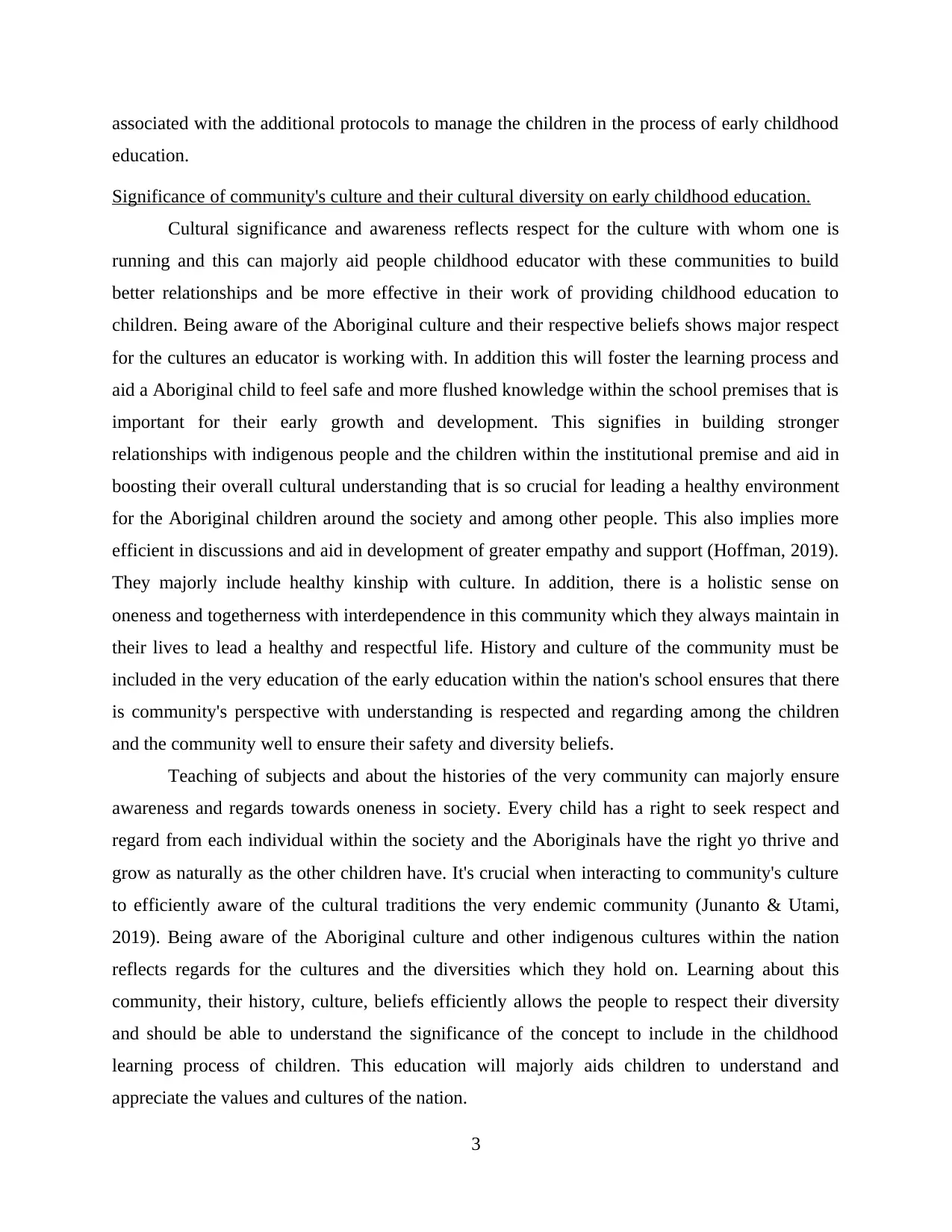
associated with the additional protocols to manage the children in the process of early childhood
education.
Significance of community's culture and their cultural diversity on early childhood education.
Cultural significance and awareness reflects respect for the culture with whom one is
running and this can majorly aid people childhood educator with these communities to build
better relationships and be more effective in their work of providing childhood education to
children. Being aware of the Aboriginal culture and their respective beliefs shows major respect
for the cultures an educator is working with. In addition this will foster the learning process and
aid a Aboriginal child to feel safe and more flushed knowledge within the school premises that is
important for their early growth and development. This signifies in building stronger
relationships with indigenous people and the children within the institutional premise and aid in
boosting their overall cultural understanding that is so crucial for leading a healthy environment
for the Aboriginal children around the society and among other people. This also implies more
efficient in discussions and aid in development of greater empathy and support (Hoffman, 2019).
They majorly include healthy kinship with culture. In addition, there is a holistic sense on
oneness and togetherness with interdependence in this community which they always maintain in
their lives to lead a healthy and respectful life. History and culture of the community must be
included in the very education of the early education within the nation's school ensures that there
is community's perspective with understanding is respected and regarding among the children
and the community well to ensure their safety and diversity beliefs.
Teaching of subjects and about the histories of the very community can majorly ensure
awareness and regards towards oneness in society. Every child has a right to seek respect and
regard from each individual within the society and the Aboriginals have the right yo thrive and
grow as naturally as the other children have. It's crucial when interacting to community's culture
to efficiently aware of the cultural traditions the very endemic community (Junanto & Utami,
2019). Being aware of the Aboriginal culture and other indigenous cultures within the nation
reflects regards for the cultures and the diversities which they hold on. Learning about this
community, their history, culture, beliefs efficiently allows the people to respect their diversity
and should be able to understand the significance of the concept to include in the childhood
learning process of children. This education will majorly aids children to understand and
appreciate the values and cultures of the nation.
3
education.
Significance of community's culture and their cultural diversity on early childhood education.
Cultural significance and awareness reflects respect for the culture with whom one is
running and this can majorly aid people childhood educator with these communities to build
better relationships and be more effective in their work of providing childhood education to
children. Being aware of the Aboriginal culture and their respective beliefs shows major respect
for the cultures an educator is working with. In addition this will foster the learning process and
aid a Aboriginal child to feel safe and more flushed knowledge within the school premises that is
important for their early growth and development. This signifies in building stronger
relationships with indigenous people and the children within the institutional premise and aid in
boosting their overall cultural understanding that is so crucial for leading a healthy environment
for the Aboriginal children around the society and among other people. This also implies more
efficient in discussions and aid in development of greater empathy and support (Hoffman, 2019).
They majorly include healthy kinship with culture. In addition, there is a holistic sense on
oneness and togetherness with interdependence in this community which they always maintain in
their lives to lead a healthy and respectful life. History and culture of the community must be
included in the very education of the early education within the nation's school ensures that there
is community's perspective with understanding is respected and regarding among the children
and the community well to ensure their safety and diversity beliefs.
Teaching of subjects and about the histories of the very community can majorly ensure
awareness and regards towards oneness in society. Every child has a right to seek respect and
regard from each individual within the society and the Aboriginals have the right yo thrive and
grow as naturally as the other children have. It's crucial when interacting to community's culture
to efficiently aware of the cultural traditions the very endemic community (Junanto & Utami,
2019). Being aware of the Aboriginal culture and other indigenous cultures within the nation
reflects regards for the cultures and the diversities which they hold on. Learning about this
community, their history, culture, beliefs efficiently allows the people to respect their diversity
and should be able to understand the significance of the concept to include in the childhood
learning process of children. This education will majorly aids children to understand and
appreciate the values and cultures of the nation.
3
⊘ This is a preview!⊘
Do you want full access?
Subscribe today to unlock all pages.

Trusted by 1+ million students worldwide
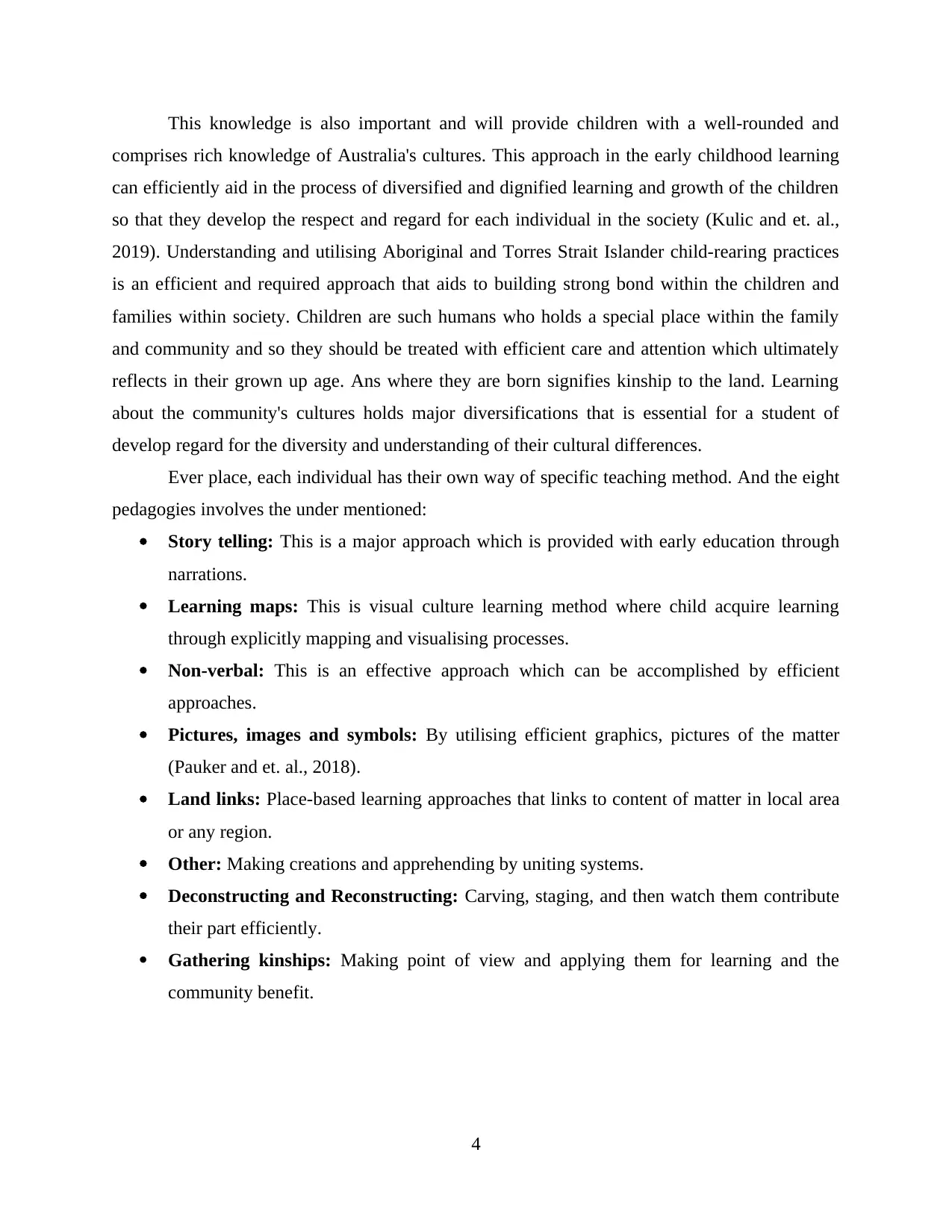
This knowledge is also important and will provide children with a well-rounded and
comprises rich knowledge of Australia's cultures. This approach in the early childhood learning
can efficiently aid in the process of diversified and dignified learning and growth of the children
so that they develop the respect and regard for each individual in the society (Kulic and et. al.,
2019). Understanding and utilising Aboriginal and Torres Strait Islander child-rearing practices
is an efficient and required approach that aids to building strong bond within the children and
families within society. Children are such humans who holds a special place within the family
and community and so they should be treated with efficient care and attention which ultimately
reflects in their grown up age. Ans where they are born signifies kinship to the land. Learning
about the community's cultures holds major diversifications that is essential for a student of
develop regard for the diversity and understanding of their cultural differences.
Ever place, each individual has their own way of specific teaching method. And the eight
pedagogies involves the under mentioned:
Story telling: This is a major approach which is provided with early education through
narrations.
Learning maps: This is visual culture learning method where child acquire learning
through explicitly mapping and visualising processes.
Non-verbal: This is an effective approach which can be accomplished by efficient
approaches.
Pictures, images and symbols: By utilising efficient graphics, pictures of the matter
(Pauker and et. al., 2018).
Land links: Place-based learning approaches that links to content of matter in local area
or any region.
Other: Making creations and apprehending by uniting systems.
Deconstructing and Reconstructing: Carving, staging, and then watch them contribute
their part efficiently.
Gathering kinships: Making point of view and applying them for learning and the
community benefit.
4
comprises rich knowledge of Australia's cultures. This approach in the early childhood learning
can efficiently aid in the process of diversified and dignified learning and growth of the children
so that they develop the respect and regard for each individual in the society (Kulic and et. al.,
2019). Understanding and utilising Aboriginal and Torres Strait Islander child-rearing practices
is an efficient and required approach that aids to building strong bond within the children and
families within society. Children are such humans who holds a special place within the family
and community and so they should be treated with efficient care and attention which ultimately
reflects in their grown up age. Ans where they are born signifies kinship to the land. Learning
about the community's cultures holds major diversifications that is essential for a student of
develop regard for the diversity and understanding of their cultural differences.
Ever place, each individual has their own way of specific teaching method. And the eight
pedagogies involves the under mentioned:
Story telling: This is a major approach which is provided with early education through
narrations.
Learning maps: This is visual culture learning method where child acquire learning
through explicitly mapping and visualising processes.
Non-verbal: This is an effective approach which can be accomplished by efficient
approaches.
Pictures, images and symbols: By utilising efficient graphics, pictures of the matter
(Pauker and et. al., 2018).
Land links: Place-based learning approaches that links to content of matter in local area
or any region.
Other: Making creations and apprehending by uniting systems.
Deconstructing and Reconstructing: Carving, staging, and then watch them contribute
their part efficiently.
Gathering kinships: Making point of view and applying them for learning and the
community benefit.
4
Paraphrase This Document
Need a fresh take? Get an instant paraphrase of this document with our AI Paraphraser
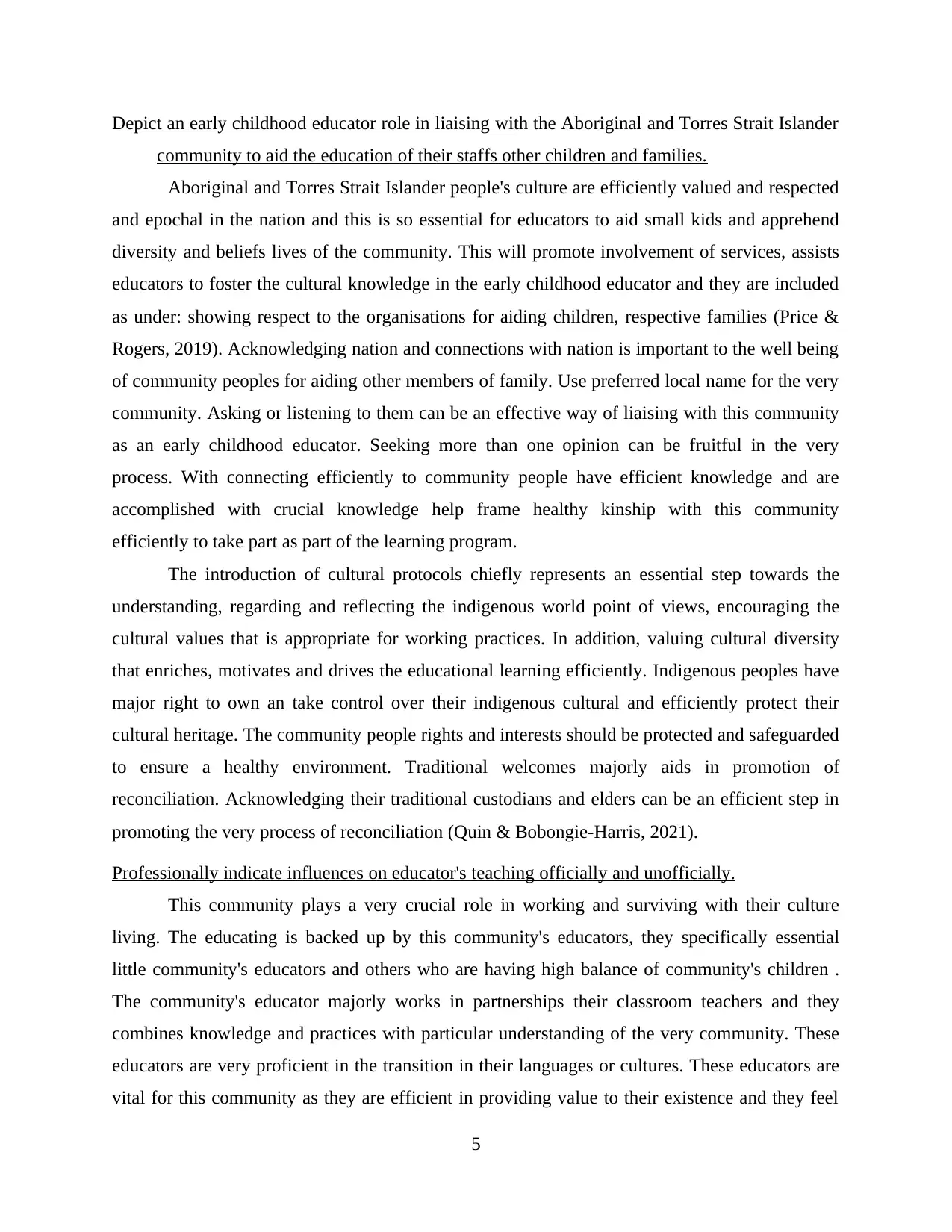
Depict an early childhood educator role in liaising with the Aboriginal and Torres Strait Islander
community to aid the education of their staffs other children and families.
Aboriginal and Torres Strait Islander people's culture are efficiently valued and respected
and epochal in the nation and this is so essential for educators to aid small kids and apprehend
diversity and beliefs lives of the community. This will promote involvement of services, assists
educators to foster the cultural knowledge in the early childhood educator and they are included
as under: showing respect to the organisations for aiding children, respective families (Price &
Rogers, 2019). Acknowledging nation and connections with nation is important to the well being
of community peoples for aiding other members of family. Use preferred local name for the very
community. Asking or listening to them can be an effective way of liaising with this community
as an early childhood educator. Seeking more than one opinion can be fruitful in the very
process. With connecting efficiently to community people have efficient knowledge and are
accomplished with crucial knowledge help frame healthy kinship with this community
efficiently to take part as part of the learning program.
The introduction of cultural protocols chiefly represents an essential step towards the
understanding, regarding and reflecting the indigenous world point of views, encouraging the
cultural values that is appropriate for working practices. In addition, valuing cultural diversity
that enriches, motivates and drives the educational learning efficiently. Indigenous peoples have
major right to own an take control over their indigenous cultural and efficiently protect their
cultural heritage. The community people rights and interests should be protected and safeguarded
to ensure a healthy environment. Traditional welcomes majorly aids in promotion of
reconciliation. Acknowledging their traditional custodians and elders can be an efficient step in
promoting the very process of reconciliation (Quin & Bobongie-Harris, 2021).
Professionally indicate influences on educator's teaching officially and unofficially.
This community plays a very crucial role in working and surviving with their culture
living. The educating is backed up by this community's educators, they specifically essential
little community's educators and others who are having high balance of community's children .
The community's educator majorly works in partnerships their classroom teachers and they
combines knowledge and practices with particular understanding of the very community. These
educators are very proficient in the transition in their languages or cultures. These educators are
vital for this community as they are efficient in providing value to their existence and they feel
5
community to aid the education of their staffs other children and families.
Aboriginal and Torres Strait Islander people's culture are efficiently valued and respected
and epochal in the nation and this is so essential for educators to aid small kids and apprehend
diversity and beliefs lives of the community. This will promote involvement of services, assists
educators to foster the cultural knowledge in the early childhood educator and they are included
as under: showing respect to the organisations for aiding children, respective families (Price &
Rogers, 2019). Acknowledging nation and connections with nation is important to the well being
of community peoples for aiding other members of family. Use preferred local name for the very
community. Asking or listening to them can be an effective way of liaising with this community
as an early childhood educator. Seeking more than one opinion can be fruitful in the very
process. With connecting efficiently to community people have efficient knowledge and are
accomplished with crucial knowledge help frame healthy kinship with this community
efficiently to take part as part of the learning program.
The introduction of cultural protocols chiefly represents an essential step towards the
understanding, regarding and reflecting the indigenous world point of views, encouraging the
cultural values that is appropriate for working practices. In addition, valuing cultural diversity
that enriches, motivates and drives the educational learning efficiently. Indigenous peoples have
major right to own an take control over their indigenous cultural and efficiently protect their
cultural heritage. The community people rights and interests should be protected and safeguarded
to ensure a healthy environment. Traditional welcomes majorly aids in promotion of
reconciliation. Acknowledging their traditional custodians and elders can be an efficient step in
promoting the very process of reconciliation (Quin & Bobongie-Harris, 2021).
Professionally indicate influences on educator's teaching officially and unofficially.
This community plays a very crucial role in working and surviving with their culture
living. The educating is backed up by this community's educators, they specifically essential
little community's educators and others who are having high balance of community's children .
The community's educator majorly works in partnerships their classroom teachers and they
combines knowledge and practices with particular understanding of the very community. These
educators are very proficient in the transition in their languages or cultures. These educators are
vital for this community as they are efficient in providing value to their existence and they feel
5
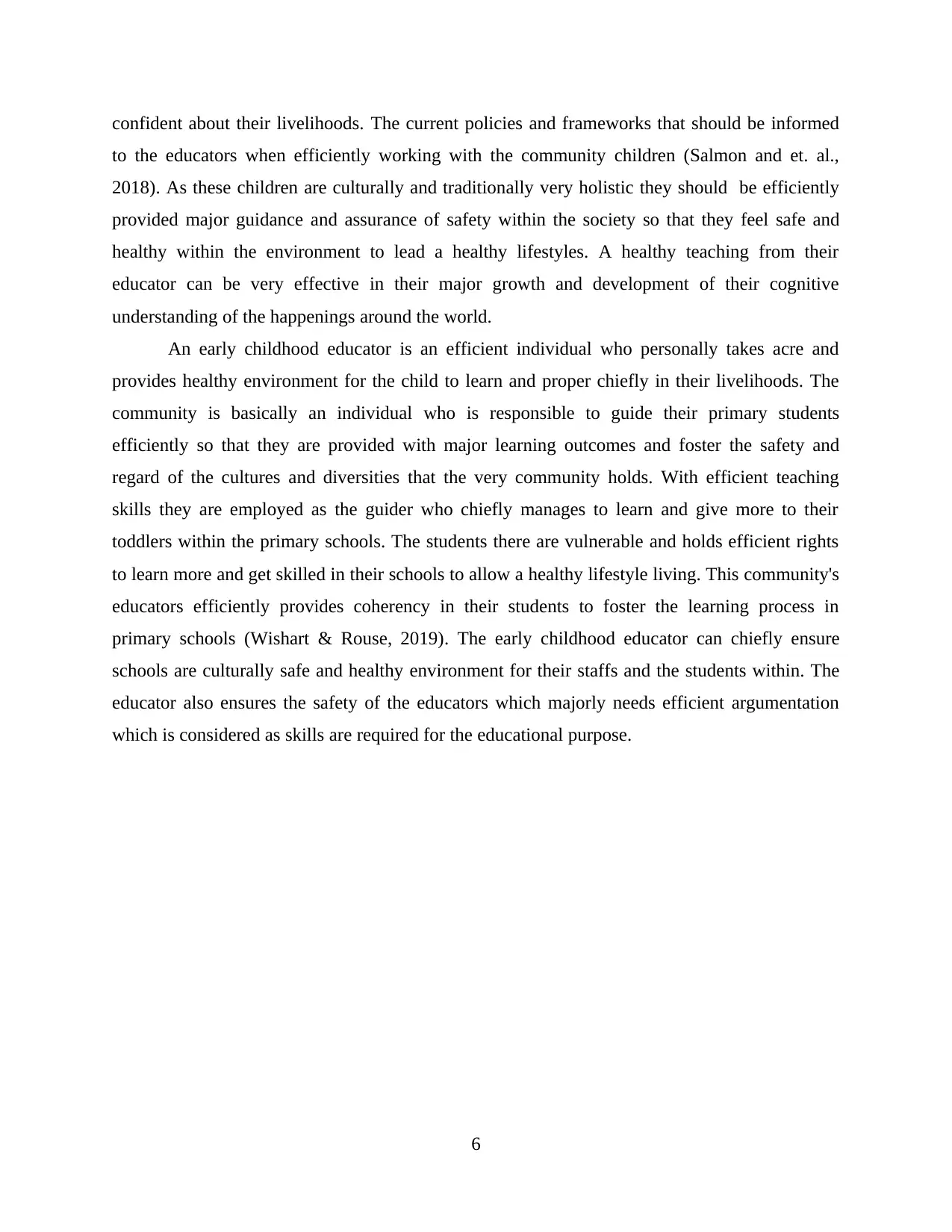
confident about their livelihoods. The current policies and frameworks that should be informed
to the educators when efficiently working with the community children (Salmon and et. al.,
2018). As these children are culturally and traditionally very holistic they should be efficiently
provided major guidance and assurance of safety within the society so that they feel safe and
healthy within the environment to lead a healthy lifestyles. A healthy teaching from their
educator can be very effective in their major growth and development of their cognitive
understanding of the happenings around the world.
An early childhood educator is an efficient individual who personally takes acre and
provides healthy environment for the child to learn and proper chiefly in their livelihoods. The
community is basically an individual who is responsible to guide their primary students
efficiently so that they are provided with major learning outcomes and foster the safety and
regard of the cultures and diversities that the very community holds. With efficient teaching
skills they are employed as the guider who chiefly manages to learn and give more to their
toddlers within the primary schools. The students there are vulnerable and holds efficient rights
to learn more and get skilled in their schools to allow a healthy lifestyle living. This community's
educators efficiently provides coherency in their students to foster the learning process in
primary schools (Wishart & Rouse, 2019). The early childhood educator can chiefly ensure
schools are culturally safe and healthy environment for their staffs and the students within. The
educator also ensures the safety of the educators which majorly needs efficient argumentation
which is considered as skills are required for the educational purpose.
6
to the educators when efficiently working with the community children (Salmon and et. al.,
2018). As these children are culturally and traditionally very holistic they should be efficiently
provided major guidance and assurance of safety within the society so that they feel safe and
healthy within the environment to lead a healthy lifestyles. A healthy teaching from their
educator can be very effective in their major growth and development of their cognitive
understanding of the happenings around the world.
An early childhood educator is an efficient individual who personally takes acre and
provides healthy environment for the child to learn and proper chiefly in their livelihoods. The
community is basically an individual who is responsible to guide their primary students
efficiently so that they are provided with major learning outcomes and foster the safety and
regard of the cultures and diversities that the very community holds. With efficient teaching
skills they are employed as the guider who chiefly manages to learn and give more to their
toddlers within the primary schools. The students there are vulnerable and holds efficient rights
to learn more and get skilled in their schools to allow a healthy lifestyle living. This community's
educators efficiently provides coherency in their students to foster the learning process in
primary schools (Wishart & Rouse, 2019). The early childhood educator can chiefly ensure
schools are culturally safe and healthy environment for their staffs and the students within. The
educator also ensures the safety of the educators which majorly needs efficient argumentation
which is considered as skills are required for the educational purpose.
6
⊘ This is a preview!⊘
Do you want full access?
Subscribe today to unlock all pages.

Trusted by 1+ million students worldwide
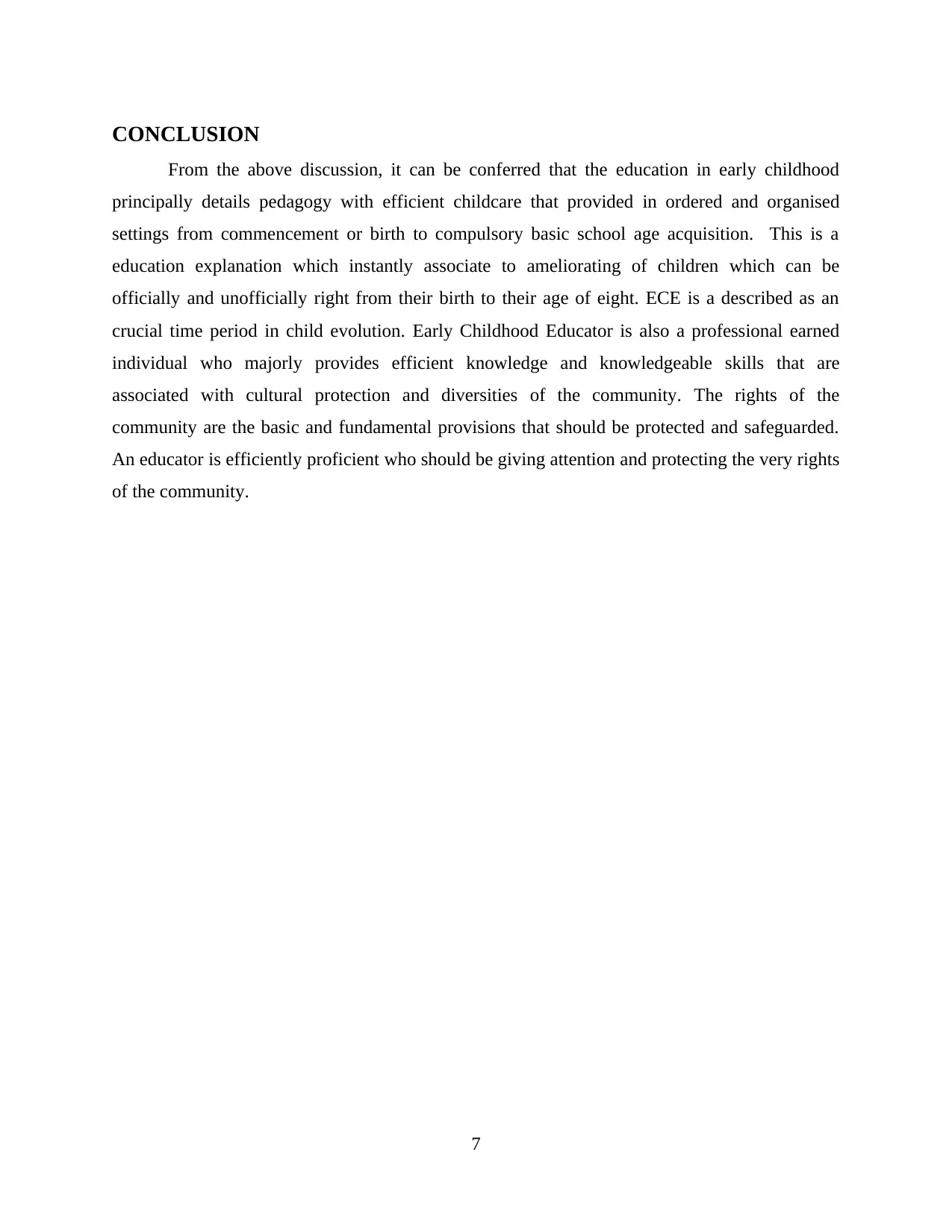
CONCLUSION
From the above discussion, it can be conferred that the education in early childhood
principally details pedagogy with efficient childcare that provided in ordered and organised
settings from commencement or birth to compulsory basic school age acquisition. This is a
education explanation which instantly associate to ameliorating of children which can be
officially and unofficially right from their birth to their age of eight. ECE is a described as an
crucial time period in child evolution. Early Childhood Educator is also a professional earned
individual who majorly provides efficient knowledge and knowledgeable skills that are
associated with cultural protection and diversities of the community. The rights of the
community are the basic and fundamental provisions that should be protected and safeguarded.
An educator is efficiently proficient who should be giving attention and protecting the very rights
of the community.
7
From the above discussion, it can be conferred that the education in early childhood
principally details pedagogy with efficient childcare that provided in ordered and organised
settings from commencement or birth to compulsory basic school age acquisition. This is a
education explanation which instantly associate to ameliorating of children which can be
officially and unofficially right from their birth to their age of eight. ECE is a described as an
crucial time period in child evolution. Early Childhood Educator is also a professional earned
individual who majorly provides efficient knowledge and knowledgeable skills that are
associated with cultural protection and diversities of the community. The rights of the
community are the basic and fundamental provisions that should be protected and safeguarded.
An educator is efficiently proficient who should be giving attention and protecting the very rights
of the community.
7
Paraphrase This Document
Need a fresh take? Get an instant paraphrase of this document with our AI Paraphraser
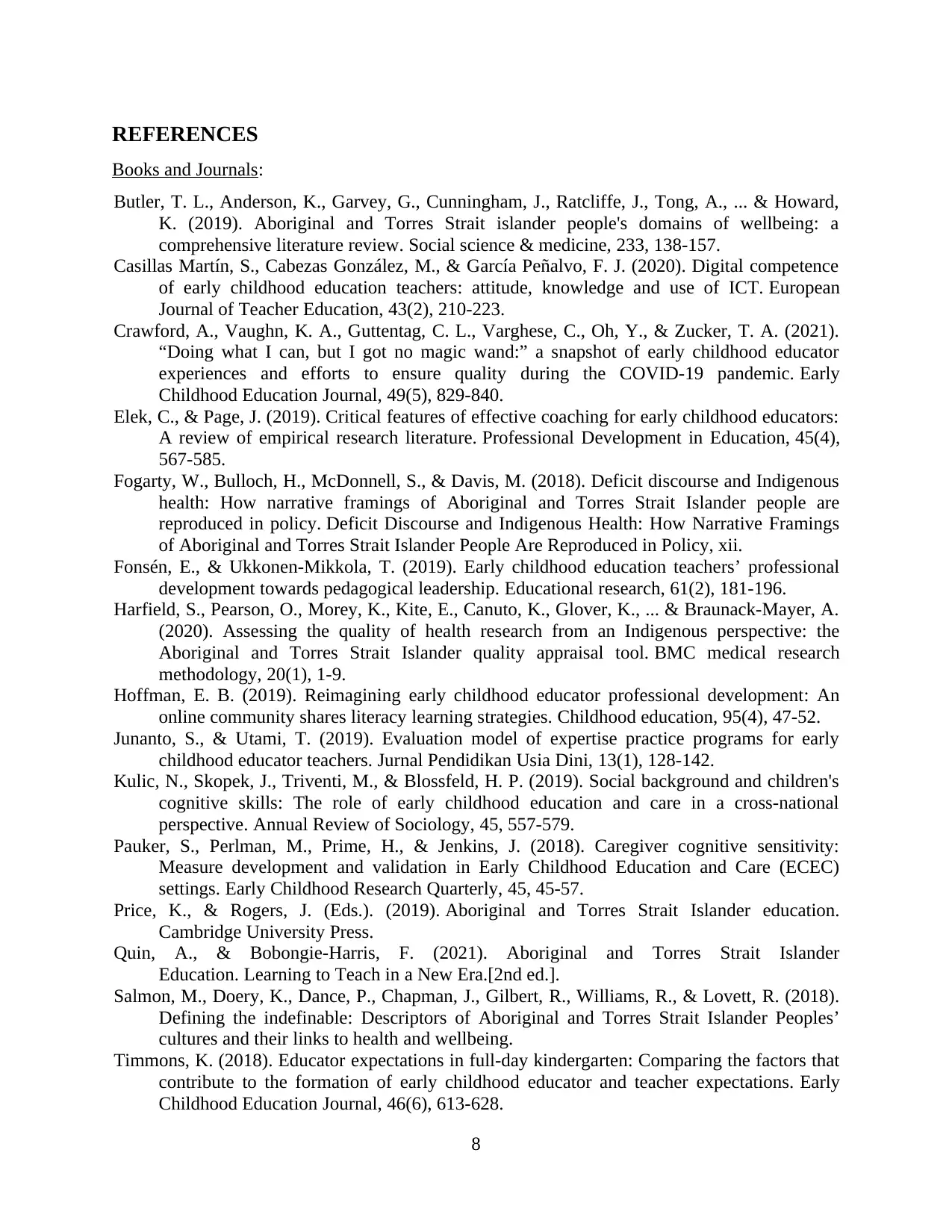
REFERENCES
Books and Journals:
Butler, T. L., Anderson, K., Garvey, G., Cunningham, J., Ratcliffe, J., Tong, A., ... & Howard,
K. (2019). Aboriginal and Torres Strait islander people's domains of wellbeing: a
comprehensive literature review. Social science & medicine, 233, 138-157.
Casillas Martín, S., Cabezas González, M., & García Peñalvo, F. J. (2020). Digital competence
of early childhood education teachers: attitude, knowledge and use of ICT. European
Journal of Teacher Education, 43(2), 210-223.
Crawford, A., Vaughn, K. A., Guttentag, C. L., Varghese, C., Oh, Y., & Zucker, T. A. (2021).
“Doing what I can, but I got no magic wand:” a snapshot of early childhood educator
experiences and efforts to ensure quality during the COVID-19 pandemic. Early
Childhood Education Journal, 49(5), 829-840.
Elek, C., & Page, J. (2019). Critical features of effective coaching for early childhood educators:
A review of empirical research literature. Professional Development in Education, 45(4),
567-585.
Fogarty, W., Bulloch, H., McDonnell, S., & Davis, M. (2018). Deficit discourse and Indigenous
health: How narrative framings of Aboriginal and Torres Strait Islander people are
reproduced in policy. Deficit Discourse and Indigenous Health: How Narrative Framings
of Aboriginal and Torres Strait Islander People Are Reproduced in Policy, xii.
Fonsén, E., & Ukkonen-Mikkola, T. (2019). Early childhood education teachers’ professional
development towards pedagogical leadership. Educational research, 61(2), 181-196.
Harfield, S., Pearson, O., Morey, K., Kite, E., Canuto, K., Glover, K., ... & Braunack-Mayer, A.
(2020). Assessing the quality of health research from an Indigenous perspective: the
Aboriginal and Torres Strait Islander quality appraisal tool. BMC medical research
methodology, 20(1), 1-9.
Hoffman, E. B. (2019). Reimagining early childhood educator professional development: An
online community shares literacy learning strategies. Childhood education, 95(4), 47-52.
Junanto, S., & Utami, T. (2019). Evaluation model of expertise practice programs for early
childhood educator teachers. Jurnal Pendidikan Usia Dini, 13(1), 128-142.
Kulic, N., Skopek, J., Triventi, M., & Blossfeld, H. P. (2019). Social background and children's
cognitive skills: The role of early childhood education and care in a cross-national
perspective. Annual Review of Sociology, 45, 557-579.
Pauker, S., Perlman, M., Prime, H., & Jenkins, J. (2018). Caregiver cognitive sensitivity:
Measure development and validation in Early Childhood Education and Care (ECEC)
settings. Early Childhood Research Quarterly, 45, 45-57.
Price, K., & Rogers, J. (Eds.). (2019). Aboriginal and Torres Strait Islander education.
Cambridge University Press.
Quin, A., & Bobongie-Harris, F. (2021). Aboriginal and Torres Strait Islander
Education. Learning to Teach in a New Era.[2nd ed.].
Salmon, M., Doery, K., Dance, P., Chapman, J., Gilbert, R., Williams, R., & Lovett, R. (2018).
Defining the indefinable: Descriptors of Aboriginal and Torres Strait Islander Peoples’
cultures and their links to health and wellbeing.
Timmons, K. (2018). Educator expectations in full-day kindergarten: Comparing the factors that
contribute to the formation of early childhood educator and teacher expectations. Early
Childhood Education Journal, 46(6), 613-628.
8
Books and Journals:
Butler, T. L., Anderson, K., Garvey, G., Cunningham, J., Ratcliffe, J., Tong, A., ... & Howard,
K. (2019). Aboriginal and Torres Strait islander people's domains of wellbeing: a
comprehensive literature review. Social science & medicine, 233, 138-157.
Casillas Martín, S., Cabezas González, M., & García Peñalvo, F. J. (2020). Digital competence
of early childhood education teachers: attitude, knowledge and use of ICT. European
Journal of Teacher Education, 43(2), 210-223.
Crawford, A., Vaughn, K. A., Guttentag, C. L., Varghese, C., Oh, Y., & Zucker, T. A. (2021).
“Doing what I can, but I got no magic wand:” a snapshot of early childhood educator
experiences and efforts to ensure quality during the COVID-19 pandemic. Early
Childhood Education Journal, 49(5), 829-840.
Elek, C., & Page, J. (2019). Critical features of effective coaching for early childhood educators:
A review of empirical research literature. Professional Development in Education, 45(4),
567-585.
Fogarty, W., Bulloch, H., McDonnell, S., & Davis, M. (2018). Deficit discourse and Indigenous
health: How narrative framings of Aboriginal and Torres Strait Islander people are
reproduced in policy. Deficit Discourse and Indigenous Health: How Narrative Framings
of Aboriginal and Torres Strait Islander People Are Reproduced in Policy, xii.
Fonsén, E., & Ukkonen-Mikkola, T. (2019). Early childhood education teachers’ professional
development towards pedagogical leadership. Educational research, 61(2), 181-196.
Harfield, S., Pearson, O., Morey, K., Kite, E., Canuto, K., Glover, K., ... & Braunack-Mayer, A.
(2020). Assessing the quality of health research from an Indigenous perspective: the
Aboriginal and Torres Strait Islander quality appraisal tool. BMC medical research
methodology, 20(1), 1-9.
Hoffman, E. B. (2019). Reimagining early childhood educator professional development: An
online community shares literacy learning strategies. Childhood education, 95(4), 47-52.
Junanto, S., & Utami, T. (2019). Evaluation model of expertise practice programs for early
childhood educator teachers. Jurnal Pendidikan Usia Dini, 13(1), 128-142.
Kulic, N., Skopek, J., Triventi, M., & Blossfeld, H. P. (2019). Social background and children's
cognitive skills: The role of early childhood education and care in a cross-national
perspective. Annual Review of Sociology, 45, 557-579.
Pauker, S., Perlman, M., Prime, H., & Jenkins, J. (2018). Caregiver cognitive sensitivity:
Measure development and validation in Early Childhood Education and Care (ECEC)
settings. Early Childhood Research Quarterly, 45, 45-57.
Price, K., & Rogers, J. (Eds.). (2019). Aboriginal and Torres Strait Islander education.
Cambridge University Press.
Quin, A., & Bobongie-Harris, F. (2021). Aboriginal and Torres Strait Islander
Education. Learning to Teach in a New Era.[2nd ed.].
Salmon, M., Doery, K., Dance, P., Chapman, J., Gilbert, R., Williams, R., & Lovett, R. (2018).
Defining the indefinable: Descriptors of Aboriginal and Torres Strait Islander Peoples’
cultures and their links to health and wellbeing.
Timmons, K. (2018). Educator expectations in full-day kindergarten: Comparing the factors that
contribute to the formation of early childhood educator and teacher expectations. Early
Childhood Education Journal, 46(6), 613-628.
8
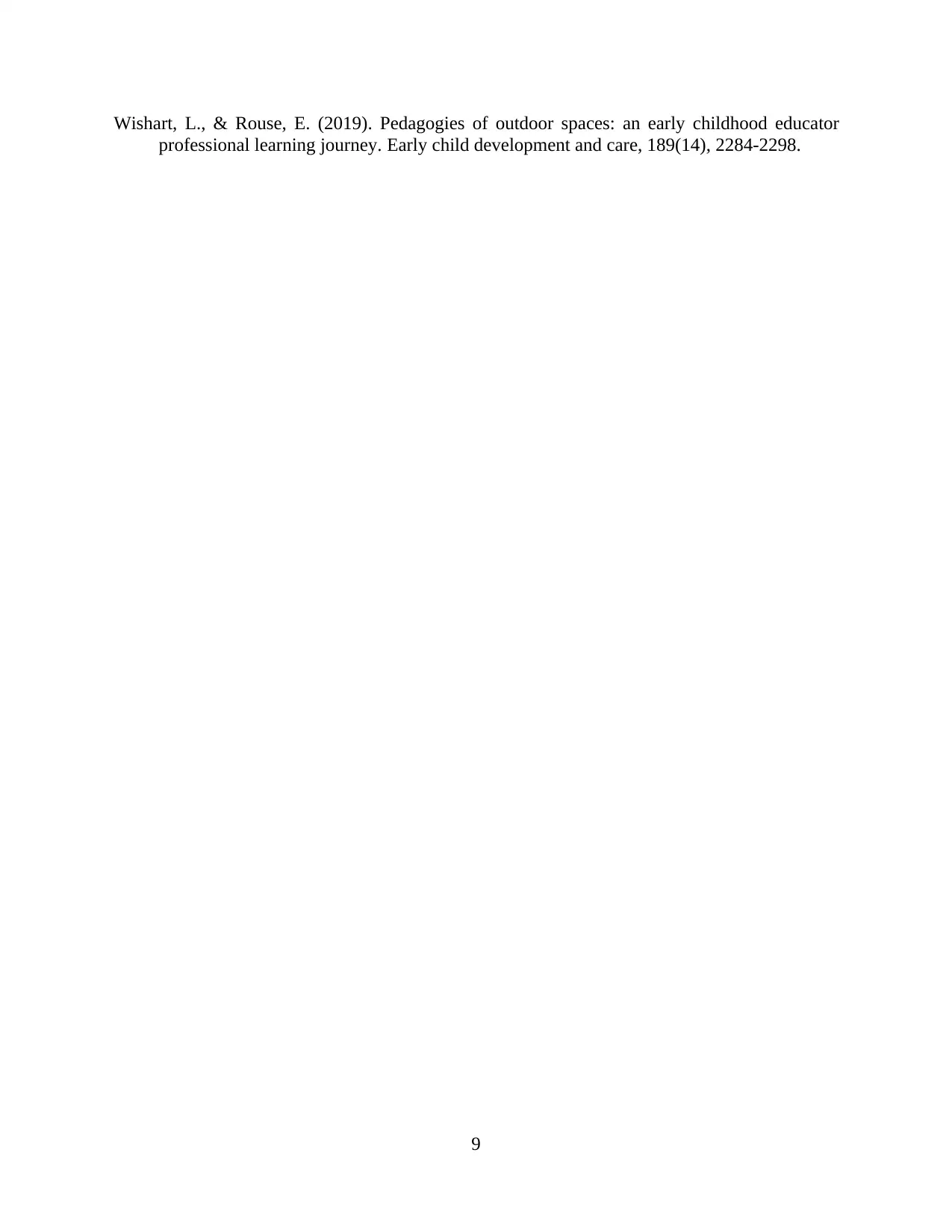
Wishart, L., & Rouse, E. (2019). Pedagogies of outdoor spaces: an early childhood educator
professional learning journey. Early child development and care, 189(14), 2284-2298.
9
professional learning journey. Early child development and care, 189(14), 2284-2298.
9
⊘ This is a preview!⊘
Do you want full access?
Subscribe today to unlock all pages.

Trusted by 1+ million students worldwide
1 out of 12
Related Documents
Your All-in-One AI-Powered Toolkit for Academic Success.
+13062052269
info@desklib.com
Available 24*7 on WhatsApp / Email
![[object Object]](/_next/static/media/star-bottom.7253800d.svg)
Unlock your academic potential
Copyright © 2020–2026 A2Z Services. All Rights Reserved. Developed and managed by ZUCOL.





